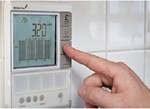The National Audit Office (NAO) has said risks remain regarding the roll out of smart meters, which, if remain unsolved, will mean the scheme is not cost-effective.
 After conducting a report on the scheme, the NAO has concluded that the Department for Energy and Climate Change (DECC) has still not proven that the roll out of smart meters into homes will achieve full value for money. Currently, under Government plans, smart meters will be installed in every single home between 2014 and 2019.
After conducting a report on the scheme, the NAO has concluded that the Department for Energy and Climate Change (DECC) has still not proven that the roll out of smart meters into homes will achieve full value for money. Currently, under Government plans, smart meters will be installed in every single home between 2014 and 2019.
Smart meters are digital devices which are designed to give real-time energy readings to energy providers and should help households to monitor and reduce their energy use. The NAO is calling on the Government to address the concern that the use of smart meters may not enable the level of energy savings as expected. DECC has estimated that households will enjoy savings benefits of £23 a year.
The NAO has pointed out that the £23 a year figure was based on the presumption that not only would consumers change their behaviour such as only using electricity at certain times of the day, but that companies would pass on the benefits of not having to send out meter readers.
The smart meter scheme is expected to cost £11.3 billion to implement.


